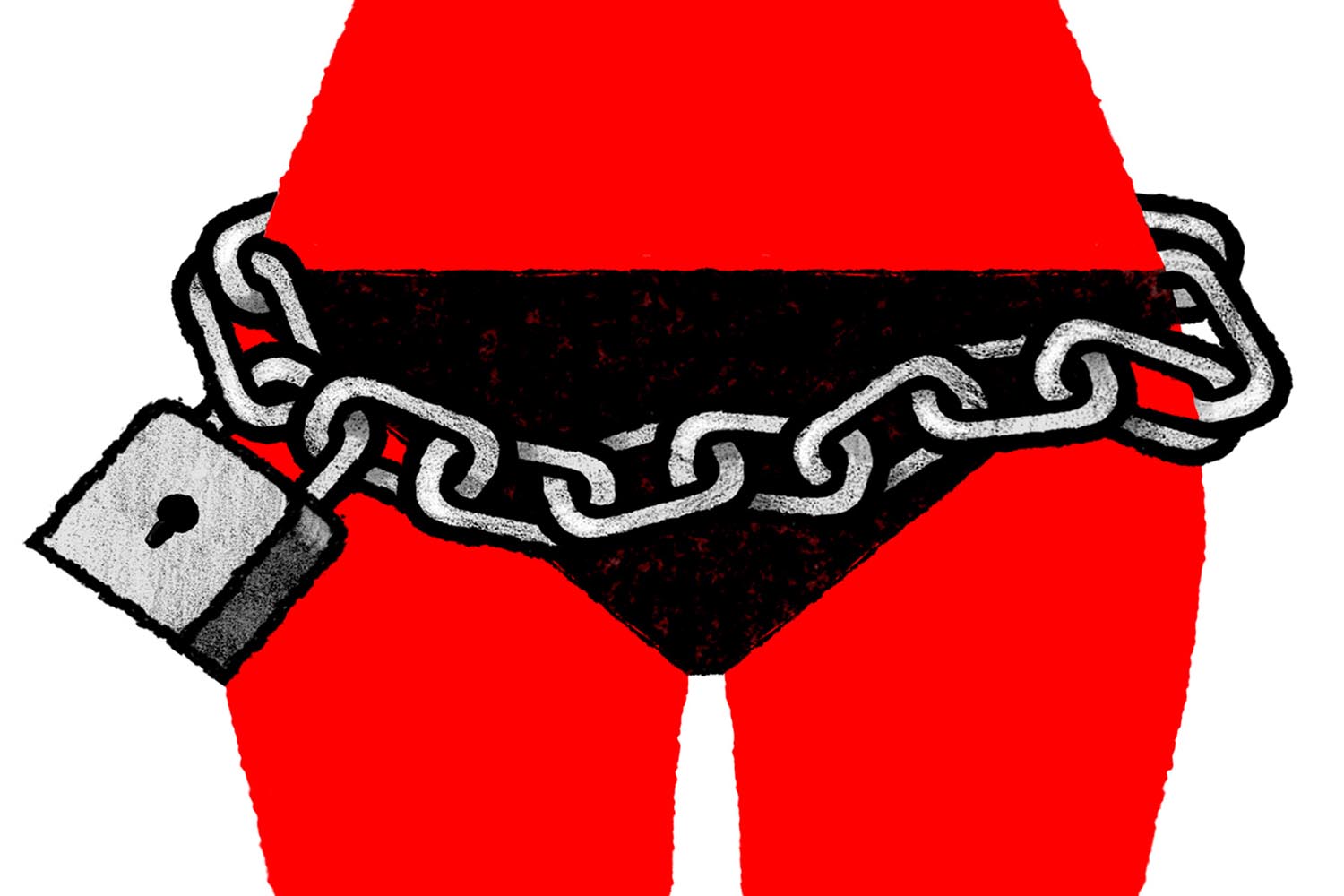Sorry, but no one is allowed to be horny any more. Horniness is very 2024. Horniness has gone the way of Elf Bars, sustainability, Hinge, doing CBT, describing things as “chic”, Moo Deng, Love Island, body positivity, and posting tweets. We’re over it. It’s done. And whenever the culture has decided on a vibe shift and that something once good is now done and boring and over, it needs a hate-figure to focus its anger on. Someone to hover our societal thumb over, Gladiator-style, before deciding they should be fed to the lions. Someone to burn at the stake for the crime of being passé. This is how Sabrina Carpenter became the Joan of Arc for short horny women.
Carpenter released her new album cover last week, a few days before she graced the cover of Rolling Stone magazine. The former sees her on all fours in a minidress and heels. A man in a suit, just out of frame, holds a handful of her hair as though it’s a leash, a play on the album title, Man’s Best Friend. The latter, shot by the photographer David LaChapelle, is an Aphrodite-inspired photo of her – also kneeling – in nothing but white suspenders, with her body covered strategically by long hair extensions. In Carpenter’s usual style, they’re a side-eyed expression of camp sexuality, something cartoonish and nostalgic. More Betty Boop than Bonnie Blue. PG-adjacent, really. Perhaps a 12A at a push.
That didn’t stop both photographs being discussed as though she was being indicted for war crimes. Held up as a paragon of third wave “choice feminism” (again, very passé), Carpenter was accused on social media of profiting off the degradation and domestic abuse of women, of being a “pick-me girl” or turning women’s liberation into a joke. Many column inches have been devoted to debating whether Sabrina Carpenter is a misogynist (because she’s hot and always going on about shagging) or a misandrist (because her latest song, Manchild, calls boys dumb pigs), whether her imagery is savvy, controversy-tempting satire, sex-positive femininity or simply pandering to the male gaze.
Carpenter isn’t the only casualty of the horny wars. Last week, Addison Rae was sneered at for her performance at the Box nightclub in London, where she lip-synced in silk underwear. When Sydney Sweeney’s sold-out soap made with her own bathwater was listed on resell sites for up to $2,000, she was criticised for oversexualising herself (and by extension all women) and appropriating sex work to boot. For years there’s been a crusade against “unnecessary” sex scenes in film and TV (accused of being voyeuristic and distracting), so much so that it’s become a genre of discourse of its own. Even the vernacular of shagging is gone; cringe but stylistically necessary terms like “lover” have been replaced with the sanitised doom of “talking stages”.
We are on the frontlines of a new war on shagging
We are on the frontlines of a new war on shagging
There are plenty of good and decent arguments to be made, of course, about the sexualisation of young women in the public eye, about the legitimacy of sex work and the importance of intimacy coordinators on set, but I am not making any of those arguments here. I am simply observing that we are on the frontlines of a new war on shagging. Or, to put it less sensationally, I am saying that perhaps people are becoming slightly more puritanical about overt displays of sexuality. Our short cultural memory and the reactionary echo chamber that is social media means that Carpenter’s visuals are seen as “new lows” for women, but the same prudish pearl-clutching was applied to Miley Cyrus during her Bangerz era. And even disregarding these examples, the new-new-online-puritanism movement is having, or at least reflecting, a real world effect.
Research, particularly focused on gen Z (those in prime shagging years), frequently reports the declining popularity of casual sex and one-night stands, with a swing towards social conservatism and traditional attitudes to celibacy and monogamy instead. One survey published by the Times in February showed a marked shift between Zoomers and millennials when it came to attitudes on religion, sex, dating and pornography. When the survey had been published 20 years earlier, 78% of those surveyed reported that they had casual sex or one-night stands, compared to just 23% in 2024. Not losing your virginity long into young adulthood has become more commonplace, too; in both the UK and US there are enough adult virgins to commission reality shows like Channel 4’s Virgin Island and TLC’s Virgins, to investigate this phenomenon. It’s worth noting here that the impact of Covid-19 can’t really be discounted; young people had their socialising curtailed by almost three years of lockdown. And it’s that same pandemic overhang we have to thank for the thing that’s replaced horniness in our cultural and personal lives: wellness.
It’s ironic that in an era where people are having less sex and complaining more about seeing sex in magazines, music and films, everyone looks hotter than ever before. Wellness has become the new status symbol, the new focus of our lives. Dating apps got boring so running clubs replaced them. Clean eating and solitary gym sessions help us become our best selves for others to view on social media, while avoiding real life contact with anyone. People consume less alcohol, so they’re more likely to flirt at a gym than a nightclub. The spectre of illness that hung over our lives since 2020 has made us single-minded in pursuit of wholesomeness.
Body optimisation, through plastic surgery and, more recently, the mass-market popularity of weight-loss drugs like Ozempic, has changed how we feel about desire and being desired. Looking sexy, rather than being sexual, has become aspirational. And by the same token vulnerability, authenticity and messiness have become antithetical to modern, beautiful, sexless life. As film writer Raquel S Benedict put it in her viral essay: “Everyone is beautiful and no one is horny.” “Now, we are perfect islands of emotional self-reliance, and it is seen as embarrassing and co-dependent to want to be touched. We are doing this for ourselves, because we, apropos of nothing, desperately want to achieve a physical standard set by some invisible Other in an insurance office somewhere.”
Is it any wonder that everyone got so furious at Sabrina Carpenter? She made the cardinal sin of any pop star: she misjudged the cultural mood. Once, it might have been true that sex sells. It’s just that in today’s individualised uncanny valley of hotness, nobody wants to admit to buying it.
Illustration by David Foldvari
Newsletters
Choose the newsletters you want to receive
View more
For information about how The Observer protects your data, read our Privacy Policy

